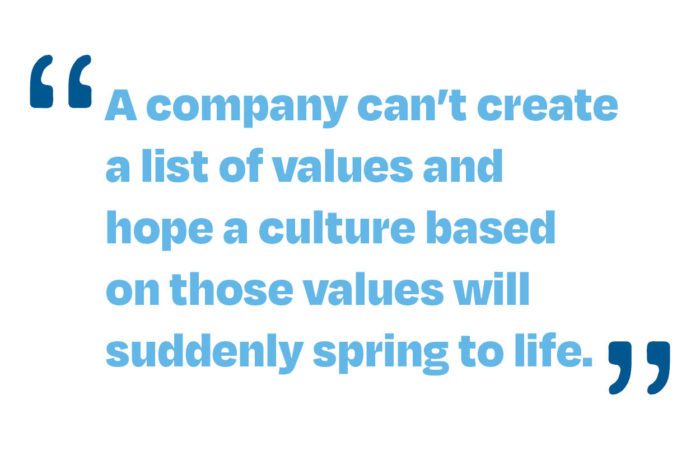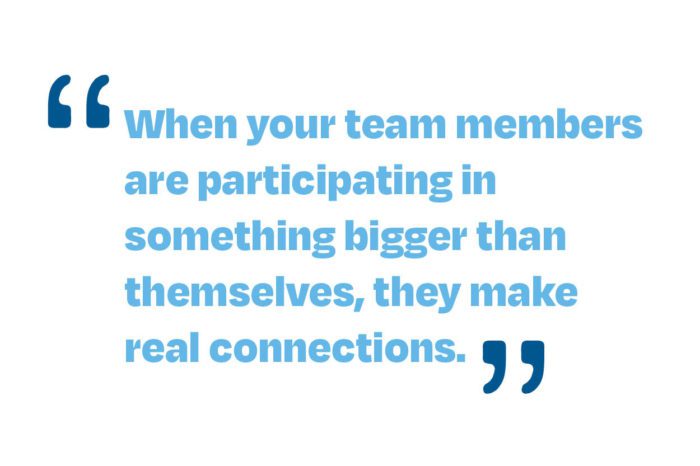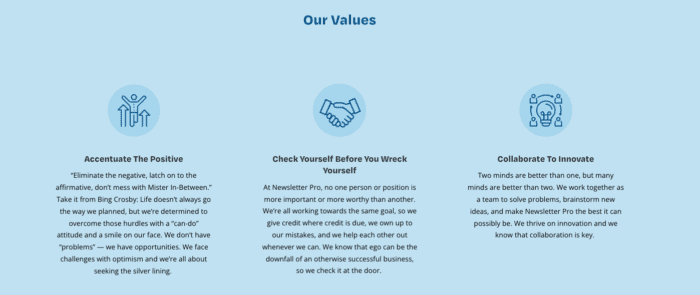Can you say, right this second, that your company culture supports your core values?

If you said yes, congratulations! You’ve achieved something many organizations strive for, yet constantly come up short in actually doing.
If you said no, or you don’t know, that’s okay too. Or, if your organization doesn’t have core values, now might be a good time to consider a few. Creating those core values and sticking to them are some of the first and most important steps you will take in establishing the company culture for your business.
Living your company’s values, the set of self-truths that define the organization as a whole, isn’t always easy, and defining exactly what your company culture is can be nebulous. So, how can you take your core values from the page and turn them into reality? It all starts by figuring out who you are and what you want your company to stand for or accomplish.
Who Are You?
You get together with your management team and hash out a series of values and beliefs, you share them with the organization, you talk about them and reiterate them — but the words don’t mean anything if they aren’t acted upon. A company can’t create a list of values and hope a culture based on those values will suddenly spring to life.

The relationship between values and culture is more complex. The two influence one another and have a certain harmony — or they should. Culture can be an unwieldy creature. It constantly evolves and requires a measure of flexibility, or it might break.
You may have drafted 10 core values when your company was still in its infancy. Since those first steps, your company has worked to live by those values. But as your company has grown and evolved, bringing on new team members and adopting new methods of operation, the level of cohesiveness you once enjoyed might not be there anymore.
As companies grow and don’t properly adapt, cracks begin to show. This can manifest itself in a number of ways, including a decline in collaboration among teams and team members, as well as complacency, one of the many killers of productivity.
How Do You Respond?
Start by putting away the sledgehammer. When cracks appear, don’t smash everything and start over, as tempting as that might be. Respond with finely tuned adjustments. Ask yourself what needs to happen. Do you need to modify your core values? Or are you simply not living those core values the way they were meant to be lived?
If you developed the perfect list of core values, but you aren’t doing anything about it, company culture languishes. Culture is built on action. Get yourself and your team living the core values. This doesn’t mean you have to force action (if you do, then there may be a problem with the core values themselves).
Let culture happen.
Action can occur in a few different ways. First, look at how your core values are defined. Remove ambiguity. Core values should make sense to outsiders and employees alike. Then, when everything is clear and concise, it becomes easier to apply your values to the real world. Team members can recognize and celebrate others within the organization who are living the values and contributing to company culture.
Escalate the celebration of your core values to activities or events. These aren’t necessarily team-building exercises but are more ways to see company values in action. When your team members are participating in something bigger than themselves, they make real connections. The company’s values, and by extension, its culture, transform into something tangible people can grab on to and take with them.

How these activities or events unfold is dependent on the company and its values. You might organize charitable events where employees can come together for the benefit of their community and each other. Some companies have regular barbecues or potlucks. Others install game rooms or have an off-the-hook juice bar in the break room. You do what fits.
Or do what your team members already love doing. Go to them for answers. You’ve already invested in bringing together an amazing group of people, and chances are if they have workplace chemistry, there are common threads woven through your organization. Pull that thread and see where it takes you.
Why Do Any Of This?
When you take time to focus on building and driving company culture forward, this culture can end up becoming a major part of who your company is. This, right alongside core values, answers that very important question: Who are you? A strong culture is a talking point when people reference your business.
Online shoe and apparel retailer Zappos is a prime example of this. The company is known for their methodical hiring process. They get to know the people they’re really interested in, going as far as building a social network all applicants must join to even be considered. They want to be completely sure new hires will fit into the company’s well-defined culture.
Zappos’ approach is the reason their company culture is so cohesive internally and revered externally. They take serious time in getting to know a potential hire. This helps keep turnover low, averaging less than 20% across the company over a 7-year period. Lower turnover means less expense in hiring and training new team members.
Plus, when you get to know the team you’ve assembled and team members getting to know one another outside of their respective departments, this can prove critical in developing a company culture.
The Growing Importance Of Company Culture
In the past, company culture was an added benefit you could boast about to potential new employees. You were able to share your core values with the potential new hire during the interview process to encourage them that this is truly a place they want to be. Now, company culture has become something much more important than it used to be.
The internet has grown immensely over the past few decades. Ten years ago, you might not have been able to find much insight into a company’s culture. You had to look at their website (if they had one) or speak with current or former employees to understand the work environment. In today’s climate, there are a number of ways prospective employees can check out your business before they even apply for the job.
Prospective candidates, especially if they’re a Gen Z or a millennial, are going to research your company before applying. They’ll look at your profile on Glassdoor and other similar sites to see what past employees have said about your business. They want to know that other people have enjoyed their time working with your company, and if they haven’t, they likely won’t apply. Some candidates may even check owner responses on Google Reviews to ensure that you’re someone they want to work for.

What If My Company Went Remote Or Hybrid?
You might think that company culture becomes less important if your company works in a remote or hybrid environment, but that couldn’t be further from the truth. Your company culture means everything if your employees are not interacting with each other in person on a regular basis. A healthy company culture will allow all of your employees to be heard equally, regardless of where they’re located. This is going to take some additional effort on your part to ensure that all employees feel fulfilled and heard in their roles.
If your team works remotely, there are some practices that you should follow to help build and improve your company culture, while making all employees feel welcome and equal. A great tactic is to host company meetings at least once a week. This can be more or less feasible depending on the size of your business. If your business employs over 100 people, you should split them up and have team meetings, where each team can discuss what’s going on in the business or share happenings from their personal lives. This will allow your employees to get to know each other better, which creates a level of camaraderie that’s beneficial for everyone. If you take this route, still plan on having at least one companywide meeting a month to discuss important business news. And encourage your team members to keep their cameras on during these meetings so everyone can see each other. It helps make people feel more comfortable and communicate better in future interactions.
If you fail to develop a company culture for your remote and hybrid workers, they will feel disconnected from the business and will eventually disengage. People want their work to have meaning. They want to believe in what they do and enjoy doing it. You can offer someone their dream job, but they’ll grow tired of it quickly if the company culture is lacking.
Prepare For Benefits
You’ve regularly held company or team meetings, checked in with your employees for feedback, and done everything else in your power to promote your company culture and get your employees to buy into it, so how do you know if it’s working? It starts with listening to your employees and paying attention to their work and progress. When your employees believe in the company culture, they’ll do everything they can to ensure the company continues moving in the right direction. This should lead to improvements in productivity for everyone involved.
You’ll also notice an incredible difference in your employees’ mood and sometimes, even their health or mental well-being. They’ll enjoy coming into work, which will lead to fewer absences, as they’ll be less likely to skip work for a mental health day. This improved mood will even have a beneficial effect on your customers. Happier employees often equates to happier customers, as their interactions are much more cordial and helpful. You can also watch for improved communication between all employees in your business. If your employees like the company culture, they’ll be less afraid to speak up and voice their opinions or concerns. This can quickly lead to greater innovation within your business.
Having the proper company culture and encouraging your employees to believe in it can be the difference between boom or bust for your business. It all starts with your core values, so truly take some time to establish some that set your company up for success. Company culture really starts to come together when team members are working together, with shared values, toward (or upholding) the mission of the organization. The core values act as guiding lights in the greater endeavor.

Take a moment and ask yourself: What have you done to promote company culture in your own organization? How are you living your company’s core values?
It’s important to nurture your employee relationships – but what about your clients? To learn more about nurturing your customer relationships, fill out the form below to download your free copy of our Nurture Report.


Recent Comments